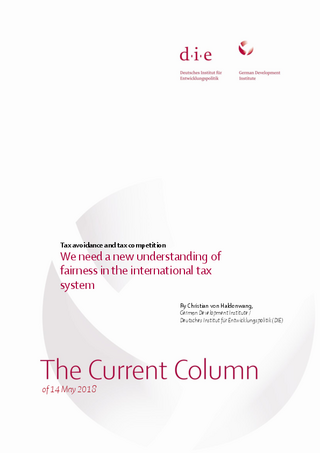Tax avoidance and tax competition
We need a new understanding of fairness in the international tax system
Haldenwang, Christian vonThe Current Column (2018)
Bonn: German Development Institute / Deutsches Institut für Entwicklungspolitik (DIE), The Current Column of 14 May 2018
Current concepts of fairness in the international fiscal system do not go far enough. They are largely focused on the notion that taxes are levied where added value is created. However, one central dimension of every national debate on the subject of tax fairness is completely ignored in the global discourse: the question of the relationship of public services to the payments regularly collected from the taxpayers. The requirement to levy taxes where added value is created is of central significance for two problems that are currently the subject of much discussion: tax avoidance, particularly by large, multinational companies, and tax competition between countries. Tax avoidance is based on the principle of artificially shifting profitable activities to a location where they are subject to low taxation - or none at all. Differing standards and legal interpretations around the world enable companies engaged in the cross-border trading of goods and (financial) services to minimise their tax burden. In addition, tax competition between countries results in a general lowering of the tax burden. This situation was recently further exacerbated by the US tax reform of December 2017. In the scope of this competition governments grant increasingly generous tax breaks to draw in capital or keep it in the country. With this they undermine their own fiscal options for providing public services - including those required for sustainable economic development. If it were possible to link entrepreneurial value creation more closely to taxation – the OECD refers to this as the ”nexus approach”, then tax avoidance and tax competition could be restricted more effectively than has been the case thus far. This would constitute considerable progress compared to the current situation. However, the nexus approach alone cannot ensure the fairness of the international tax system, as it does not go far enough with regard to key aspects. On the one hand, value added is shifted from the actual production process to upstream or downstream activities. Today value is increasingly generated in research and development, design, marketing and downstream services, less in production itself. The value-creating activities are typically located in the countries of the Global North, or in so called “tax havens”. The financing problems of many poorer states would therefore not be resolved. An even more important aspect: the relationship between value creation and the public services required for this is not always the same. Today, global value chains are constructed in a way that means that more intensive value-creating activities do not always require higher-quality public services (e.g. infrastructure, educational or social services). The principle of fiscal equivalence This is where the principle of fiscal equivalence, developed by Mancur Olson in 1969, comes into play. Fiscal equivalence implies that the circle of those who benefit from a public good should correspond to the circle of those who pay for the good. Where this principle is breached – i.e. where individuals or companies benefit without paying, or pay without benefitting – the consequence is an inefficient provision of services. This may take the form of the cross-subsidisation of certain economic activities to the detriment of other sectors, or the insufficient provision of public services to the population. An international debate that elevates value creation to the central measure of determining taxation ultimately fails to address this. It forces poorer countries in particular to adapt their service portfolio in a way that does not necessarily reflect the general will of the citizens. What needs to be done, therefore, to strengthen the principle of fiscal equivalence internationally? Firstly, governments need to take a uniform approach to establishing transparency regarding tax incentives when competing internationally. Only when this information is available is it possible to debate what incentives are desirable or even necessary. In the case of the majority of incentive mechanisms today it is not known what they cost and what economic benefit they bring. Secondly, multilateral approaches to exchanging tax-related information need to be reinforced. In particular, it should be apparent who is the actual beneficial owner of assets, as only this can enable users and payers of public services to be identified. Thirdly, it would be advantageous for the international community to achieve a common consolidated corporate tax base. This could ensure that the taxation of companies is agreed upon between states in a way that takes account of criteria such as number of employees in addition to merely turnover or profit. This would allow the respective services of the countries to be accounted for better than they have been to date.


